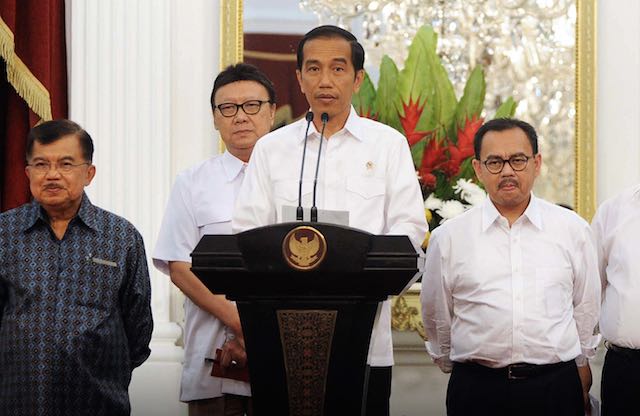SUMMARY
This is AI generated summarization, which may have errors. For context, always refer to the full article.

JAKARTA, Indonesia – Bank Indonesia, Indonesia’s central bank, raised interest rates on Tuesday, November 18, for the first time in a year in anticipation of surging inflation after the new government increased the price of subsidized fuel by over 30%.
At a special meeting called following the price increase, Bank Indonesia raised its key rate by 25 basis points to 7.75%, the first rise since November last year.
The move was aimed at keeping inflation in check, with the government’s economic ministers estimating it would lead to a 2 percentage point increase from a baseline of 5.3% for the year, as the fuel price rise pushes up the costs of transporting goods.
Inflation edged up to 4.83% in October.
Public transportation tariffs were also adjusted on Tuesday, with the Transportation Ministry capping the increase at 10%, Tempo.co reported.
President Joko “Jokowi” Widodo announced the reduction in government fuel subsidies late Monday, his first serious move to strengthen the economy since taking office last month. The move was in line with an election campaign pledge. (READ: Jokowi fulfills campaign promise, raises fuel prices)
The benchmark Jakarta Composite Index (JCI) finished up 1% at 5,102.469, the highest close since October 23, according to Bloomberg, while the rupiah strengthened 0.4%, the most since October 29, to 12,153 per dollar as of 4 p.m. in Jakarta.
The government estimates the price rise will lead to more than $8 billion of savings in next year’s budget, money that Jokowi plans to divert to overhauling infrastructure and policies to help the poorest.
The subsidies “can now be used to build schools for the young and hospitals for the old, rather than being burned in engines of cars idling in traffic jams”, said Wellian Wiranto, an economist from OCBC Bank in Singapore.
The payouts, which have in the past gobbled up 20% of the state budget, are also blamed for a widening current account deficit.
Reducing the subsidies was seen as an urgently needed move to revive the economy, which grew at 5.01% in the third quarter, its slowest pace in 5 years.
But a fuel price increase is unpopular among the public due to the effect on inflation, and small protests broke out in major cities Tuesday.
The price of petrol has risen by IDR2,000 to IDR8,500 ($0.70) a liter, an increase of just over 30%, while diesel has gone up IDR2,000 to IDR7,500 a liter, a 35% increase.
After a large fuel price increase last year, inflation jumped several points before slowly falling back to its current level. However, tighter monetary policy is also likely to weigh on growth. – with a report from Agence France-Presse/Rappler.com
Add a comment
How does this make you feel?
There are no comments yet. Add your comment to start the conversation.